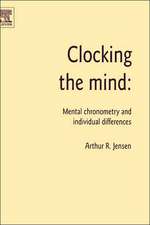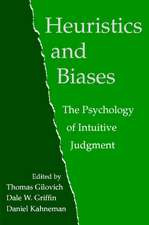Human Territorial Functioning: An Empirical, Evolutionary Perspective on Individual and Small Group Territorial Cognitions, Behaviors, and Consequences: Environment and Behavior
Autor Ralph B. Tayloren Limba Engleză Paperback – 25 aug 1988
Preț: 404.97 lei
Nou
Puncte Express: 607
Preț estimativ în valută:
77.49€ • 81.11$ • 64.50£
77.49€ • 81.11$ • 64.50£
Carte tipărită la comandă
Livrare economică 31 martie-14 aprilie
Preluare comenzi: 021 569.72.76
Specificații
ISBN-13: 9780521313070
ISBN-10: 0521313074
Pagini: 380
Dimensiuni: 152 x 228 x 17 mm
Greutate: 0.55 kg
Editura: Cambridge University Press
Colecția Cambridge University Press
Seria Environment and Behavior
Locul publicării:New York, United States
ISBN-10: 0521313074
Pagini: 380
Dimensiuni: 152 x 228 x 17 mm
Greutate: 0.55 kg
Editura: Cambridge University Press
Colecția Cambridge University Press
Seria Environment and Behavior
Locul publicării:New York, United States
Cuprins
1. Introduction; Part I. Origins of Human Territorial Functioning: 2. Territorial Functioning and Related Processes in Different Species; 3. The Origins of Human Territorial Functioning; 4. Theoretical Perspectives on Interpreting Territorial Functioning: Exactly How did it Evolve?; Part II. A Conceptual Model of Human Territorial Functioning: 5. A Perspective on Human Territorial Functioning; 6. Clarifying Psychological and Ecological Consequences; Part III. Territorial Functioning in Settings of Varying Centrality: 7. Interior Residential Settings; 8. Territorial Functioning in Outdoor Residential Spaces Close to the Home; 9. Regular Use Settings; 10. Minimal Territorial Functioning; Part IV. Applications to Social Problems: 11. Disorder; 12. Resource Conservatism; Part V. Review and Prospects: 13. Summary of the General Line of Argument and its Implications; 14 Future Directions for Research and Application.
Recenzii
"...new and refreshing look at a set of issues that have theoretical and applied implications for environment-behavior relations in many context. It will inform any reader and stimulate propositions for many years to come." Contemporary Psychology
"...an intellectual treatise which provides an update review and fresh analysis of empirical works on human territoriality." Timothy Austin, Contemporary Sociology
"...an intellectual treatise which provides an update review and fresh analysis of empirical works on human territoriality." Timothy Austin, Contemporary Sociology
Descriere
'Territorial functioning' refers to an interlocked system of sentiments, cognitions, and behaviors that are highly place-specific, and socially and culturally determined and maintaining.

























